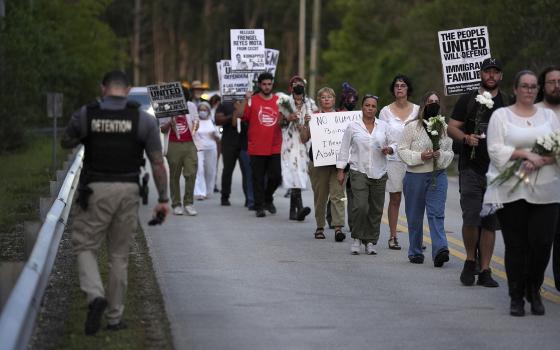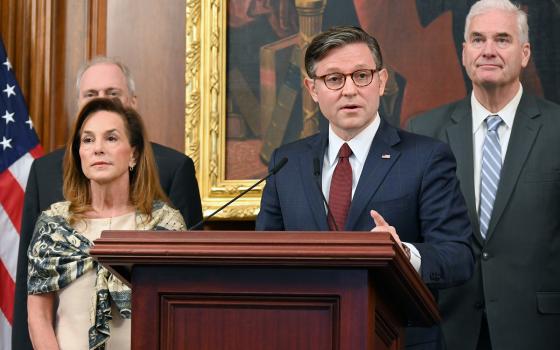There is a popular Spanish saying that observes, “Tell me who you walk with and I’ll tell you who you are.” President Obama’s nomination of Miguel Díaz as U.S. ambassador to the Holy See raises key questions about the company the nominee keeps. This interest is piqued by the relatively unknown status of Díaz in political circles, the groundbreaking nomination of the first Hispanic to hold the position and the curious selection of a Catholic theologian. To some the Díaz nomination appears baffling and to others he is the dark horse candidate that no one saw coming.
A theology professor who teaches at St. John’s University and the College of St. Benedict in Minnesota, Díaz served the Obama campaign as one of his advisors on Catholic matters, not exactly a clear path to the prominence of an ambassadorship. On the other hand, the Díaz nomination reflects Obama’s interest in promoting individuals with compelling personal narratives and the ability to be intellectually engaged yet practically aware of the complexities of daily living on local and global levels.
The nomination of Díaz brings to the forefront his theological stances and their possible impact on his role if confirmed as ambassador. A Cuban immigrant raised in Miami, Díaz is theologically located in the stream of contemporary U.S. Hispanic theologies. His scholarship and commitments reflect a posture of accompaniment, “walking with” and “being with” others. This drives the intercultural, interracial, interreligious and ecumenical sensibilities evident in his publications and in his actions. At the same time, consistent with the work of other Latino and Latina theologians, his attention to the daily as a source for critical theological reflection and his Catholic faith nourish his passion for justice and concern for those who experience marginalization. This integration is clear in a number of his works, from his first book, On Being Human: U.S. Hispanic and Rahnerian Perspectives (Orbis, 2001) to his consideration of Our Lady of Charity through the lens of theological anthropology in his contribution to the anthology From the Heart of Our People: Latino/a Explorations in Catholic Systematic Theology (Orbis, 1999).
Díaz demonstrates an ongoing concern for human dignity as it is lived and protected within community. This situates him in a position to deal with the intersecting concerns of the United States and the Holy See. His understanding of the doctrine of the Trinity is at the center of his understanding of human community and his interpretation of diversity. It is from within this theological framework that he approaches such real-world issues as immigration and interracial relations. These are themes he explores in detail in a number of essays published in the Journal of Hispanic/Latino Theology (www.latinotheology.org).
Díaz’s identity as a theologian is nurtured within the heart of the Academy of Catholic Hispanic Theologians of the United States, an association of primarily Latino and Latina scholars. He is an active member in good standing who served as president in 2006-2007. The association’s founding 21 years ago as well as its peer-reviewed journal were a response to the need for a visible and public voice articulating the faith experiences of a diverse Hispanic presence that has rapidly become the plurality of the U.S. Catholic church.
It is within the academy that Díaz participates in a process of mutual interaction with other Latino and Latina theologians and scholars. This manner of doing theology jointly within community, known as teología de conjunto, encourages accountability to each other as well as to the people theologians accompany in the contexts of their daily living. This method of respectful give-and-take also fosters an appreciation for interdisciplinary collaboration. These are experiences that would enhance a portfolio for diplomatic service.
For a number of Latinos and Latinas in the theological academy, Catholic and Protestant, this nomination is a source of unmistakable pride. Obama’s selection of Díaz recognizes our worthy and gifted colleague and taps his talents for service to the United States. It also thrusts our scholarship into a spotlight it has not previously enjoyed. The choice of a Latino theologian for a position that builds bridges of solidarity is perhaps less of a surprise within our community. Integral to our theologizing is an intentionality that privileges relationality yet comprehends the sometimes painful complications that challenge concrete practices to bring about just relationships.
In Spanish and Latin American cultures, dichos are popular expressions that communicate practical wisdom. “Dime con quién andas y te diré quién eres” invites consideration of the company one keeps and implies that the communities one accompanies shapes one’s perspective. This is a question Díaz himself addresses in his essay in From the Heart of Our People, a legitimate inquiry of one now nominated to represent the United States in a global arena.
Dr. Carmen Nanko-Fernández is past president of the Academy of Catholic Hispanic Theologians of the United States, and is assistant professor of pastoral ministry and director of the Ecumenical Doctor of Ministry Program at Catholic Theological Union in Chicago.



